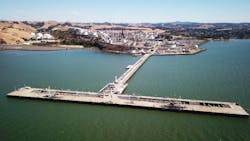Phillips 66 advances California refinery-to-renewables conversion project
Phillips 66 has started the first leg of renewable diesel production under its ongoing Rodeo Renewed project to convert the 120,000-b/d portion of its San Francisco refining complex in Rodeo, Calif. into a renewable fuels refinery as part of an investment strategy in the company’s energy transition to ensure long-term viability and competitiveness of its operations (OGJ Online, Aug. 13, 2020).
After initiating unit commissioning in April, Phillips 66 in July reached full production rates of 8,000 b/d of renewable diesel from an existing hydrocracking unit at the refinery that was repurposed to enable production of renewable fuels using Haldor Topsoe AS’ proprietary HydroFlex technology, the service provider said on Aug. 10.
Confirmation of Phillips 66’s selection of HydroFlex for the unit’s conversion to renewable fuel production service follows the operator’s announcement to investors during its Aug. 3 second-quarter 2021 earnings call that—with a completed draft of the permit for the complete Rodeo Renewed project now under internal review by regional California regulators—it expects the project’s permit to be released sometime in August to begin a required period of public review and comment.
Brought online more than 2 months ahead of the operator’s originally planned schedule, the newly reconfigured hydrotreater is equipped to process a feedstock of 9,000 b/d of soybean and other vegetable oils to produce renewable diesel, Phillips 66 said in the quarterly earnings call.
Rodeo Renewed overview
First announced in 2020, Phillip 66’s $750-800-million Rodeo Renewed project would involve construction of new pretreatment units as well as repurposing of two existing hydrocracking units to enable production of renewable diesel, renewable gasoline, and sustainable jet fuel, all of which qualify for generation of credits under the California Low Carbon Fuel Standard (LCFS).
Once fully completed, Rodeo Renewed is slated to produce more than 50,000 b/d of renewable fuels from a mix of renewable feedstocks—including soybean and cooking oils, fats, greases, and tallow—sourced from domestic and international suppliers.
As part of the project, Phillips 66 also plans to shut down the Rodeo carbon plant and 44,500-b/d Santa Maria refining site in Arroyo Grande, Calif.—which converts heavy crude oil into high-quality feedstock for further processing into gasoline, diesel, and jet fuel at the Rodeo refinery—in 2023, with associated crude pipelines also to be taken out of service in phases starting in 2023.
Following completion of the reconfiguration project, Phillips 66’s San Francisco refining complex—which consists of the Rodeo plant in the San Francisco Bay area and the Santa Maria refinery in Arroyo Grande, linked by a 200-mile pipeline—would no longer produce fuels from crude oil, resulting in anticipated 50% and 75% reductions in greenhouse gas and sulfur dioxide emissions, respectively, from the site.
In its August 2021 presentation to investors, Phillips 66 said it expects to complete full conversion of the refinery to renewable service by first-quarter 2024.
